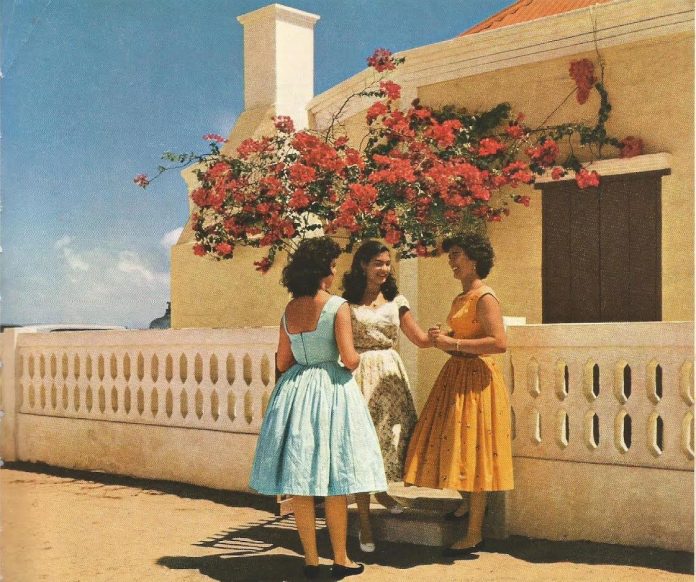Each week, Etnia Nativa presents a new cultural heritage and native knowledge episode. Awakening responsibility to acknowledge heritage, traditions, and the limited space our people had to live on. Sharing today part II of our brief introduction to the history of how Aruba’s livelihood was before oil and tourism. Natives faced a constant existential adaptation since the beginning of the Spanish era until the gold rush.
Aruba’s gainful economic life has known periods of dire extremes. There have been occasions of near famine as a result of net-to-no means of support since a great part of what the island could produce during good or bad times had to be shipped to Curacao. Periods of quick, short-lived prosperity and a stable economy based primarily on oil refining followed.
Another very profitable enterprise in Aruba’s pre-petroleum days was the mining of phosphate. During the period of 1881–1914, the Aruba Phosphaat Maatschappij * exported one million tons of phosphate. It was originally found in 1874 at Cerro Corrá (Colorado Point), and today remnants of equipment used, bent, broken, and rust covered remain in some of the large pits behind the hill where Lago Hospital used to stand. The industry ceased operation in 1914, when the price of phosphate on the world market decreased and was replaced by chemical fertilizers.
An industry that has had a century of ups and downs is the harvesting of aloe. ** The aloe is a small plant that grows in a splay-like fashion relatively close to and 18 inches from the ground. The plant produces aloin, a cathartic ingredient said to have no synthetic superior. With climatic conditions perfect for the plant’s growth, the output of the aruban-grown aloe`s aloin was much higher than that of other varieties. Aruban-grown aloe has an aloin content of 22 percent, compared to a high of 15 percent for the best aloe grown elsewhere. The brutal price fluctuations on the world market forced many aloe growers to discontinue operations. Many workers left the fields when the oil companies arrived and paid higher wages. Consequently, numerous aloe fields have been abandoned. The aloe is not from Aruba; it is originally from the island of Socotra off the west coast of Africa. It was brought here in 1861.
Petrol brought another kind of prosperity to Aruba and has been the basis of a strong economy for over a quarter of a century. The Arend Petroleum Maatschappij, a subsidiary of Royal Dutch Shell, established itself on the western end of the island today, in the Divi and Tamarijn Hotel areas. A small refinery, it maintained operations until January 1953. At the opposite end of the island, a giant in the oil world, Lago Oil & Transport Co., Ltd., strictly a refinery, had its start in the late twenties. Originally a subsidiary of the Standard Oil Co. (India), it was purchased in 1932 by the Standard Oil Co. (N.J.). Other means of subsistence have been adopted by the inhabitants of Aruba, all with varying degrees of success. Vocations over the years included making rope and straw hats, growing peanuts, shipbuilding’s, brick and potters, cultivating the one-way divi-divi tree for its pods used in the preparation of tannic acid, growing pigment bugs, blacksmith and carpintery, farming, fishing, and sailing.
When Lago Aruba Refinery decided to automate their refining industry, layoffs began so quickly that an unemployment problem arose because Aruba did not expatriate unemployed foreign workers. In order to broaden the basis of an economic existence, plans were made to attract cruise ships. The arrival of The Trade Wind, the first cruise ship of that time, on February 5, 1955, had become a historical event. ***
The construction of the first high-rise hotel, The Aruba Caribbean Hotel and Casino, attracted the jetset and famous of Hollywood, celebrities and movie stars. Tourism promised great benefits. About sharing our island’s virgin land scape, white sand beches and mistical geo formations. A offering of a considerable source of income if we to opened up our home, our house, our beloved rock.
Uncover and experience the native inspiration of your travel destination. You may like the flora, fauna, geology, history, native art, or shamanic practices of Aruba, so ground yourself in a unique native gem, an exclusive cabinet of curiosities where our acclaimed cultural columnist introduces you to a connecting conference. Visit Etnia Nativa, a magnificent home that integrates reused materials with nature and is full of island culture and heritage! Book your appointment through Whats App +297 592 2702 etnianativa03@gmail.com.
* Island Insight episode CXX- 120, episode XLI – 41.
** Island Insight episode XLIII – 43.
*** Island Insight episode XCIII 93.















